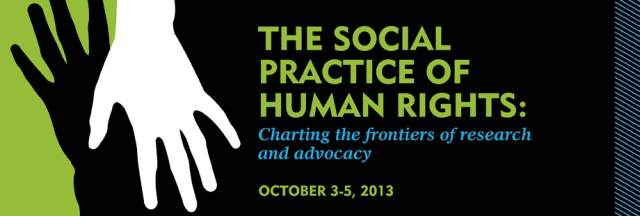Paper/Proposal Title
Human Beings and Being Human: The Making of 'Gay Rights' as Human Rights
Location
River Campus - Room M2060
Start Date
10-4-2013 9:30 AM
Abstract
Human rights, like cosmopolitanism and the English School theory concept of world society more generally, presuppose their subjects: human beings. While the position may be normatively attractive and unproblematic, buttressed by the scientific dictum that all members of the species Homo sapiens are human, multiple historical practices that have deployed difference to jettison biological sameness oppugn it. Color, ethnicity, gender, ideology, nationality, occupation, race, religion, sexuality, and sundry other identifiers have been used to justify a range of dehumanizing practices or to deny human beings the status of being human. Put differently, dystopic practices suggest something that the cosmopolitan thesis all human beings possess equal moral status does not: that being human is a social construct subject to both dismemberment and manufacture. The problem is to discern how we “make human.”
By making human I refer to two distinct, if inter-related, sets of practices and processes: first, efforts to counter the rendering of individual human beings as superfluous and expendable, and second, efforts to clarify the meaning of human dignity. The paper will explore five mechanisms—reflection on the moral worth of others, recognition of the other as an autonomous being, resistance against forms of oppression, reproduction of prevailing mores, and responsibility for self and others—that transform the dehumanized (back) into human beings. The paper will apply the framework to the internationalization of recognizing LGBT peoples and extending, sometimes enthusiastically, at other times haltingly and contentiously, rights in ways that underscore their dignity.
Human Beings and Being Human: The Making of 'Gay Rights' as Human Rights
River Campus - Room M2060
Human rights, like cosmopolitanism and the English School theory concept of world society more generally, presuppose their subjects: human beings. While the position may be normatively attractive and unproblematic, buttressed by the scientific dictum that all members of the species Homo sapiens are human, multiple historical practices that have deployed difference to jettison biological sameness oppugn it. Color, ethnicity, gender, ideology, nationality, occupation, race, religion, sexuality, and sundry other identifiers have been used to justify a range of dehumanizing practices or to deny human beings the status of being human. Put differently, dystopic practices suggest something that the cosmopolitan thesis all human beings possess equal moral status does not: that being human is a social construct subject to both dismemberment and manufacture. The problem is to discern how we “make human.”
By making human I refer to two distinct, if inter-related, sets of practices and processes: first, efforts to counter the rendering of individual human beings as superfluous and expendable, and second, efforts to clarify the meaning of human dignity. The paper will explore five mechanisms—reflection on the moral worth of others, recognition of the other as an autonomous being, resistance against forms of oppression, reproduction of prevailing mores, and responsibility for self and others—that transform the dehumanized (back) into human beings. The paper will apply the framework to the internationalization of recognizing LGBT peoples and extending, sometimes enthusiastically, at other times haltingly and contentiously, rights in ways that underscore their dignity.




Comments
This biennial conference provides a unique space for scholars, practitioners and advocates to engage in collaboration, dialogue and critical analysis of human rights advocacy — locally and globally. Learn more about the Human Rights Center at the University of Dayton >>>.